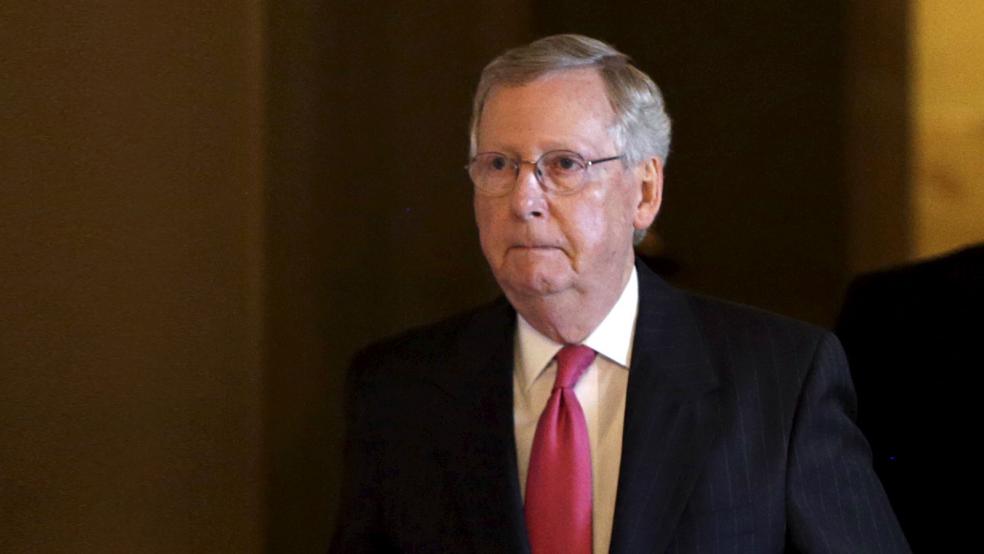The Senate has proven a frustrating institution for many a president. Donald Trump hardly qualifies as an exception, even though the new president has had some good fortune – in the form of Harry Reid. The former Senate Minority Leader undermined Senate rules in 2013 while serving as Majority Leader, bypassing cloture votes for most presidential appointments as a means to allow then-President Barack Obama to stack the DC Circuit Court of Appeals.
Not only did that allow almost everyone of Trump’s Cabinet appointments to pass through Senate confirmation, but it also provided all the precedent necessary to ensure Democrats couldn’t block his first Supreme Court nominee, Neil Gorsuch.
Related: 4 Huge Problems Congress Must Face as the Clock Ticks Down in Washington
Now, however, Trump wants an end to the filibuster altogether. The president took to his favorite platform for venting frustration to urge Senate Majority Leader Mitch McConnell to jettison the protection for the minority. “The U.S. Senate should switch to 51 votes, immediately,” Trump tweeted on Tuesday morning, “and get Healthcare and TAX CUTS approved, fast and easy. Dems would do it, no doubt!”
Perhaps they would, and perhaps they will. At present, no one seems to have learned the lesson from Reid’s ill-advised gambit in 2013, including Trump himself, except for perhaps Mitch McConnell. And even McConnell finds himself squeezed between his president, his Republican base, and the repeated demonstrations of just how easily these changes to the rules can backfire.
The choice of issues for Trump’s frustration seem particularly notable, too, because McConnell and House Speaker Paul Ryan have done as much as possible to bypass the filibuster on both. In the budget resolution at the beginning of this session of Congress, Republicans passed riders that allow for legislation on health care reform and tax reform to be considered under reconciliation in the Senate. This was another Reid innovation for majoritarian governance in passing major legislation, rather than just the budgetary adjustments for which reconciliation was developed.
Reid shoehorned the Affordable Care Act through reconciliation after former Senator Scott Brown’s special-election victory in January 2010 reduced the Democratic majority to 59 and put the filibuster back in play for the Republican minority.
Related: The $6 Trillion Health Care Blow Out Over Pre-Existing Conditions
Reconciliation isn’t exactly a slam dunk, however, as Trump has belatedly discovered. The House can pass these bills on simple majorities regardless of whether reconciliation is invoked, but the Senate parliamentarian has to rule a bill germane and favorable to deficit reduction before reconciliation applies in the upper chamber. Nervous Republicans have debated whether to allow a majority to overrule the parliamentarian on a potential negative ruling; that seems premature at this stage, especially since it might create more opportunities for backfire in future Democratic majorities.
The scoring of bills by the Congressional Budget Office looms large in those decisions, but at least in the case of the American Health Care Act (AHCA), the CBO found that it would decrease budget deficits, which makes it more likely to get a green light under reconciliation. The upcoming tax reform bill still has not made it into legislative form, but Republicans believe they can get a positive CBO score on deficit reduction there as well. If so, Trump’s two legislative priorities will only need 51 votes in the Senate anyway, even with the current rules and precedents in place.
The real problem for Trump and backers of the AHCA isn’t a requirement to get to 60 votes to defeat a cloture vote. It’s getting to 51 votes. Last week, McConnell told Reuters that he’s unsure whether he can corral a majority for the AHCA, no matter what form it eventually takes in the Senate, even if the parliamentarian approves the reconciliation process. "I don't know how we get to 50 (votes) at the moment. But that's the goal,” McConnell observed. “And exactly what the composition of that (bill) is I'm not going to speculate about because it serves no purpose."
Related: Here's How Broken Washington Is — Even Without Trump
In principle, at least, it’s worth speculating a little. Democrats rammed through a massive bill that imposed a mandate on all Americans without any partnership with Republicans by manipulating Senate rules, and the result has been a disaster which they completely own. Had they worked more closely with Republicans, there would have been an investment on both sides of the aisle in a different form of health-insurance restructuring, even if it didn’t fulfill all Democratic wishes. They paid a huge price for majoritarian triumphalism with Obamacare and then paid another big price in getting cut out of the confirmation process in the first Republican administration in single-party governance.
In this case, eliminating the filibuster is a solution in search of a real problem. When Republicans can get to 59 but not 60 and can’t qualify legislation under reconciliation, then rule changes might be a last-ditch option worth considering. As it is, however, Trump’s demand is a non-sequitur. Democrats provided a very valuable lesson in how triumphalist impulses can quickly backfire, even when there may be a rationale for changing the rules. Republicans need to consider those lessons, especially given the utter uselessness of the suggestion in the present environment.






